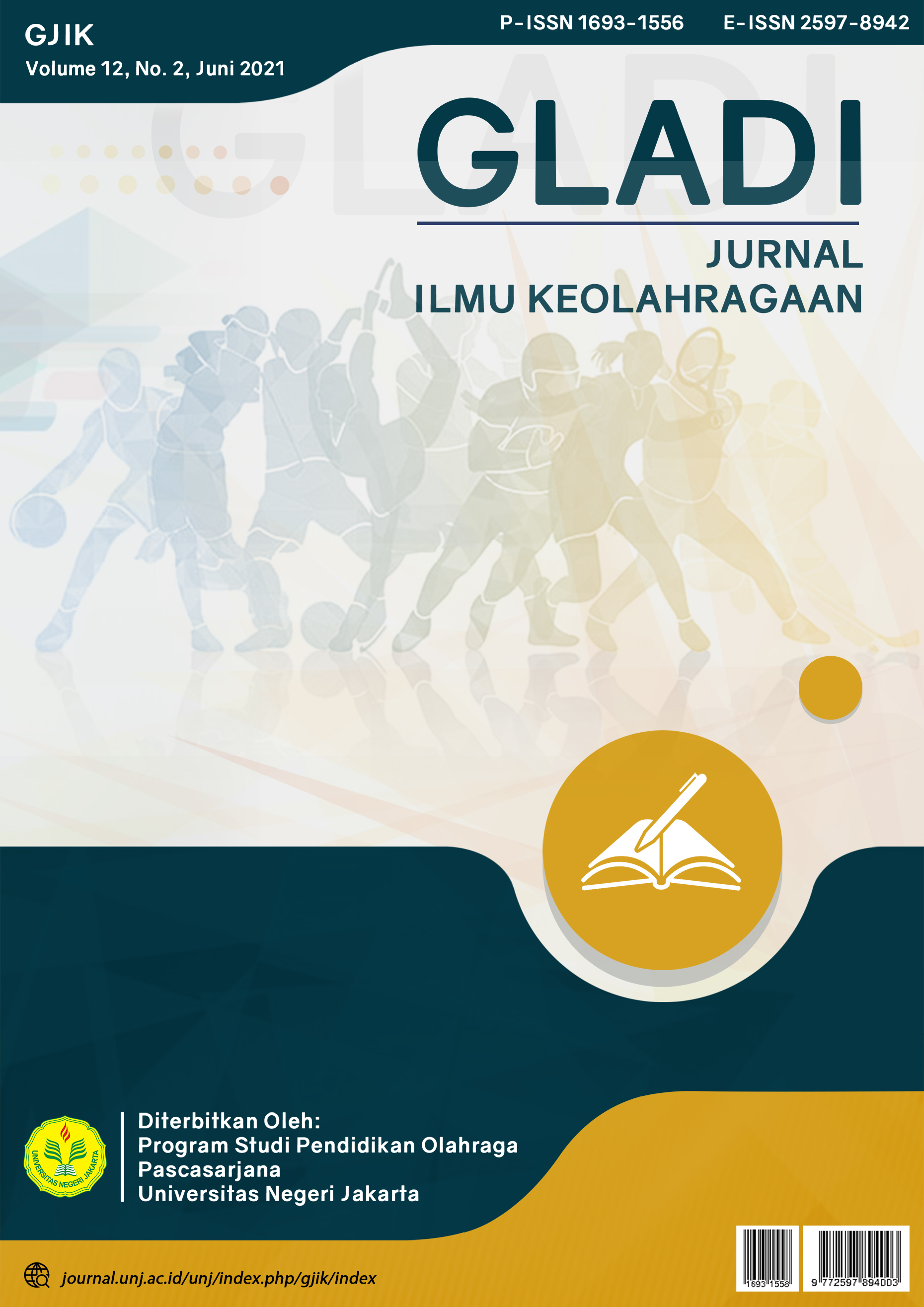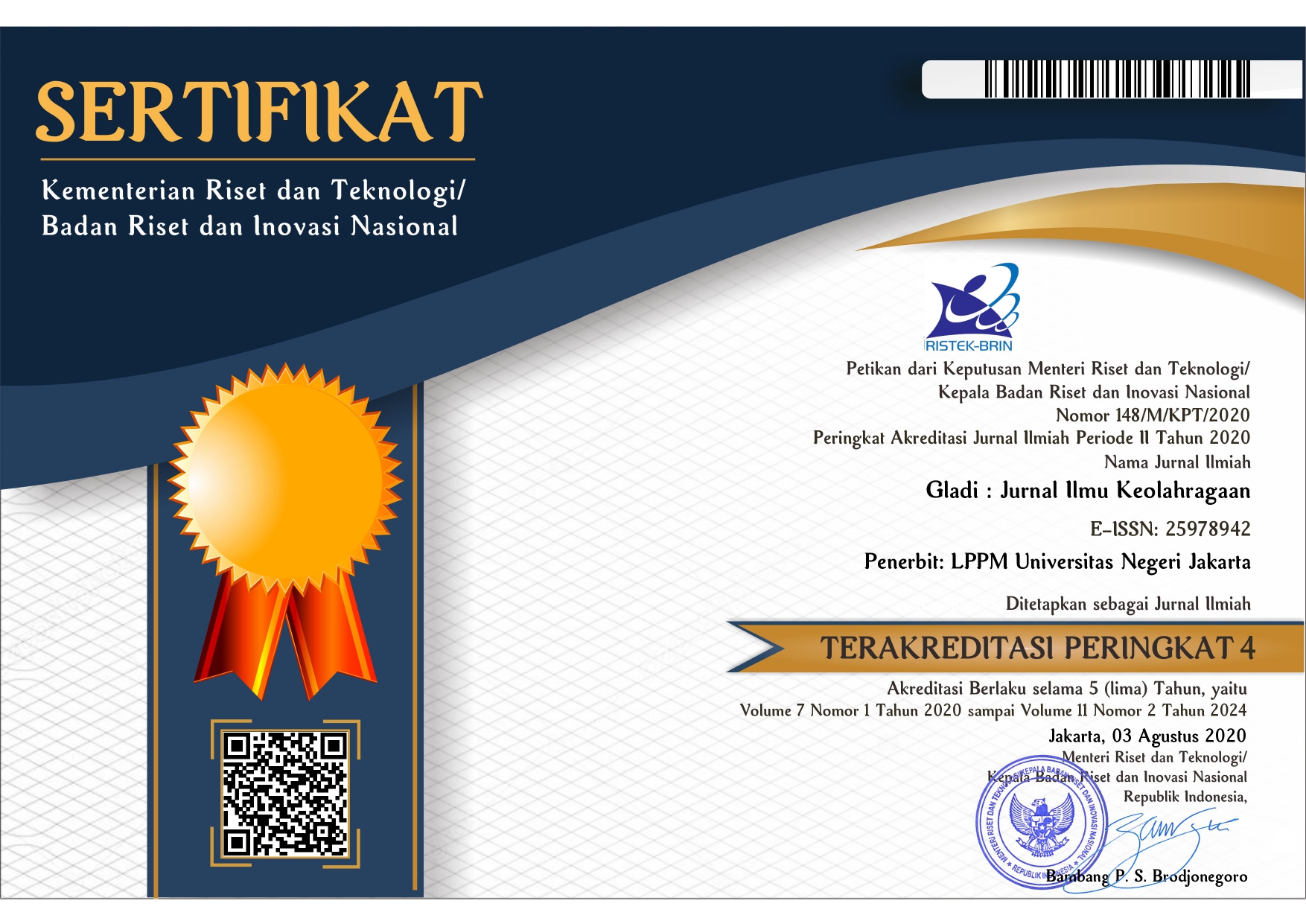LEARNING OUTCOMES OF PHYSICAL EDUCATION FOR ELEVENTH GRADE STUDENTS OF SENIOR HIGH SCHOOL
DOI:
https://doi.org/10.21009/GJIK.122.04Keywords:
aktivitas fisik; lingkungan; motivasi; hasil belajar; PJOKAbstract
This study aims to analyze and determine the effect of physical activity, learning environment, and learning motivation on physical education, sport. This study used quantitative approach with a descriptive method. This research was conducted at Senior High School 1 Cikarang Timur with a sample of 90 students of eleventh grade through simple random sampling technique. The data analysis technique used is path analysis. The results of this study indicate that (1) there is a positive direct effect of physical activity on physical education learning outcomes with a calculation of 0.258, (2) there is a positive direct influence of the learning environment on physical education learning outcomes with a calculation of 0.212, (3) there is a positive direct effect of learning motivation on physical education learning outcomes with a calculation of 0.288, (4) there is a direct positive effect of physical activity on learning motivation with a calculation of 0.325, and (5) there is a direct positive effect of the learning environment on learning motivation with a calculation of 0.334. Thus, the conclusion shows that physical activity, learning environment, and learning motivation are important factors to improve learning outcomes at Senior High School 1 Cikarang Timur.
Downloads
References
Arthur, N., Collins, S., Mcmahon, M., & Marshall, C. (2015). Career Practitionersʼ Views of Social Justice and Barriers for Practice. Canadian Journal of Career Development, 8(1), 78–84.
Baser, E. H., & Kilinc, E. (2015). Investigating Pre-service Social Studies Teachers ’ Global Social Responsibility Level Investigating Pre-service Social Studies Teachers ’ Global Social. Educational Process: International Journal, 4(1), 45–55. https://doi.org/10.12973/edupij.2015.412.4
Danilewicz, W. (2018). Participation, Education, and Global Society : International Perspectives. Polish Journal Od Education Studies, 5(2), 87–99. https://doi.org/10.2478/poljes-2018-0002
Deakin, J., Fraser-thomas, J. L., & Co, Ã. J. (2014). Youth sport programs : an avenue to foster positive youth development. Internatioan Journal of Physiology, Nutrition and Physical Education, 10(1), 19–40.
Ekawati, N. N., Hakim, A., & Noor, I. (2016). Influence Of People Participation In The Implementation Of Community Empowerment Program. Journal of Business and Management (IOSR-JBM), 18(4), 23–26. https://doi.org/10.9790/487X-1804052326
Gleave, E., Welser, H. T., Lento, T. M., & Smith, M. A. (2016). A Conceptual and Operational Definition of “ Social Role ” in Online Community. International System Sciences, 15(4), 1–11.
Hopkins, W. G. (2019). Elsevier Impact Factors Compiled in 2014 for Journals in Exercise and Sports Medicine and Science. Journal of Education and Learning, 4(5), 72–81.
Hamed, I., & Hassan, I. (2019). The Effect of Core Stability Training on Dynamic Balance and Smash Stroke Performance in Badminton Players. International Journal of Health Sciences and Research, 2(3), 44–52. https://doi.org/10.11648/j.ijsspe.20170203.12
Miles, P. G. F. F. (2018). The Motivational Theory of Role Modeling : How Role Models Influence Role Aspirants ’ Goals Review of General Psychology The Motivational Theory of Role Modeling : How Role Models (p. 223). p. 223. New York: Academic Press
Osburn, J. (2011). An Overview of Social Role Valorization Theory. The International Social Role Valorization Journal, 7(3), 65–74.
Ryan, M. K. (2015). The Motivational Theory of Role Modeling : How Role Models Influence Role Aspirants ’ Goals Review of General Psychology The Motivational Theory of Role Modeling : How Role Models. Review of General Pscyhology, 3(5), 102–115. https://doi.org/10.1037/gpr0000059
Saracho, O. N., Spodek, B., The, S., Education, E., Care, U. S., Saracho, O. N., & Spodek, B. (2017). Trustees of Boston University Children ’ S Play And Early Childhood Education : Insights From History And Theory Children ’ S Play And Early Childhood Education : Insights From History And Theory. Physical Education and Sport, 177(3), 562–576.
Tartari, E. (2015). The Use of Social Media for Academic Purposes in Student ’ Learning Process. Academic Journal Interdisiplinary Studies, 4(2), 393–398. https://doi.org/10.5901/ajis.2015.v4n2p393
Taylor, B. (2019). Exercise Physiology and Remedial Massage Therapy : kneading them together for better patient outcomes. Journal of Human Movement Studies, 1(3), 16–18.
Woue, J. (2015). Toyin Ajisafe, H uaqing Liang, Walking Dynamics in Preadolescents W ith and W ithout Down Syndrome. Journal American Physical Therapy Association, 9(5), 87–98.







